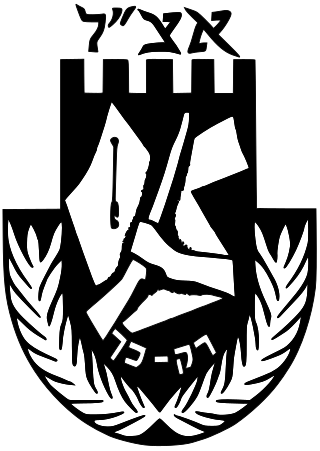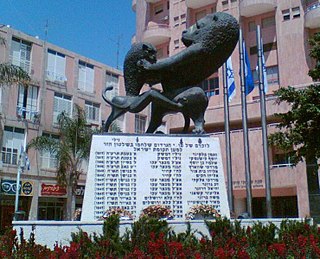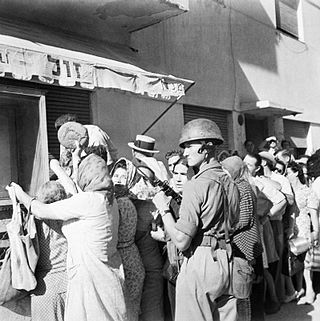
The Irgun, officially the National Military Organization in the Land of Israel, was a Zionist paramilitary organization that operated in Mandatory Palestine between 1931 and 1948. It was an offshoot of the older and larger Jewish paramilitary organization Haganah. The Irgun has been viewed as a terrorist organization or organization which carried out terrorist acts.

Zionist political violence refers to acts of political violence or terrorism committed by Zionists in support of establishing and maintaining a Jewish state in Palestine. These actions have been carried out by individuals, paramilitary groups, and the Israeli government, from the early 20th century to the present day, as part of the ongoing Israeli-Palestinian conflict.

Lehi, officially the Fighters for the Freedom of Israel and often known pejoratively as the Stern Gang, was a Zionist paramilitary militant organization founded by Avraham ("Yair") Stern in Mandatory Palestine. Its avowed aim was to evict the British authorities from Palestine by use of violence, allowing unrestricted immigration of Jews and the formation of a Jewish state. It was initially called the National Military Organization in Israel, upon being founded in August 1940, but was renamed Lehi one month later. The group referred to its members as terrorists and admitted to having carried out acts of terrorism.
During the 1948 Palestine war, massacres and acts of terror were conducted by and against both sides. A campaign of massacres and violence against the Arab population, such as occurred at Lydda and Ramle and the Battle of Haifa, led to the expulsion and flight of over 700,000 Palestinians, with most of their urban areas being depopulated and destroyed. This violence and dispossession of the Palestinians is known today as the Nakba.

A series of attacks were perpetrated or ordered by Palestinian Arabs, some of them acting as suicide bombers, on Jewish targets in Jerusalem's Ben Yehuda Street from February 1948 onwards. Ben Yehuda Street was a major thoroughfare.

The Haifa Oil Refinery massacre took place on 30 December 1947 in Mandatory Palestine, when 39–41 Jewish refinery workers were killed by their Arab coworkers in a mass lynching.

Olei Hagardom refers to members of the two Jewish Revisionist pre-state underground organisations Irgun and Lehi, most of whom were tried in British Mandate military courts and sentenced to death by hanging. Most of the executions were carried out at Acre Prison. There were 12 Olei Hagardom.
The Night of the Trains was a sabotage operation of the British railways in Palestine on November 1, 1945. The operation was one of the first carried out by the Jewish Resistance Movement, before its official establishment, and symbolized its founding.

The Jewish insurgency in Mandatory Palestine, known in the United Kingdom as the Palestine Emergency, was a paramilitary campaign carried out by Zionist militias and underground groups—including Haganah, Lehi, and Irgun—against British rule in Mandatory Palestine from 1944 to 1948. The tensions between the Zionist underground and the British mandatory authorities rose from 1938 and intensified with the publication of the White Paper of 1939. The Paper outlined new government policies to place further restrictions on Jewish immigration and land purchases, and declared the intention of giving independence to Palestine, with an Arab majority, within ten years. Though World War II brought relative calm, tensions again escalated into an armed struggle towards the end of the war, when it became clear that the Axis powers were close to defeat.

The 6th Airborne Division in Palestine was initially posted to the region as the Imperial Strategic Reserve. It was envisioned as a mobile peace keeping force, positioned to be able to respond quickly to any area of the British Empire. In fact the division became involved in an internal security role between 1945 and 1948.
Yaakov Banai born Yaakov Tunkel, Alias Mazal served as the commander of the Lehi movement's combat unit. Banai was a senior Lehi member who masterminded numerous military encounters against British and Arab targets during the Mandate period and the 1947–1949 Palestine war.

Palestine Railways was a government-owned railway company that ran all public railways in the League of Nations mandate territory of Palestine from 1920 until 1948. Its main line linked El Kantara in Egypt with Haifa. Branches served Jaffa, Jerusalem, Acre and the Jezreel Valley.

Events in the year 1947 in the British Mandate of Palestine.
Barrel bombs were used in Israel and Palestine during 1947–1948. They were first used by militant Zionist groups in Mandatory Palestine against the British. They were later used by Jews against Arabs, and also by Arabs against Jewish targets, during the 1948 Arab–Israeli war. The barrel bombs had multiple designs, including oil barrels rolled on attached truck tires, to unguided improvised bombs dropped from planes. Targets included crowds on the streets, cafes, police buildings, schools and homes. The barrel bombs were widely reported in the press and described by police as "a brand new method". The use of barrel bombs by Zionists has been described by historians as terrorism.
Martial law in Mandatory Palestine refers to the period when martial law was imposed by the British military on Jewish areas of Palestine during the Jewish insurgency in Mandatory Palestine. Statutory martial law was imposed on 2 March 1947 and enforced for 15 days in Jewish sectors of Mandatory Palestine. The crackdown was known as Operation Hippo in the greater Tel Aviv region and as Operation Elephant in the Jewish neighborhoods of Jerusalem.
On January 12, 1947, the Lehi, a Zionist paramilitary group, bombed the British police station in Haifa, Mandatory Palestine with a truck laden with explosives. It has been described as the first car bombing or truck bombing in history. The attack killed 4 and injured 142, and it ended a truce in Mandatory Palestine.
The Irgun bombed the district police headquarters in Haifa, Mandatory Palestine on September 29, 1947. The attack killed ten or twelve people, including civilians and British and Arab policemen, in addition to injuring 53 or 54 others.









